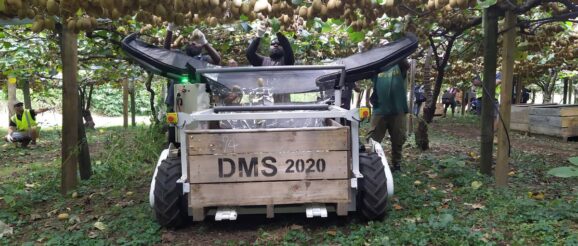Kiwifruit e-Bin innovation to help ‘exacerbated’ labour shortage – NZ Herald

An electronic fruit bin that aims to help combat the kiwifruit industry’s “exacerbated” labour shortage will be trialled next season.
The University of Waikato has developed an e-Bin that will help in the harvesting of kiwifruit and allow more people to pick the fruit.
The innovation is a collaboration with Bay of Plenty-based kiwifruit marketer and project sponsor Zespri and has involved students and academics from the university’s School of Engineering as well as industry experts.
Nick Pickering, lecturer at the university’s School of Engineering, said the challenge was to use automation technology to invent something that would help kiwifruit pickers on orchards and open up jobs to a wider group of people.
“The industry is suffering serious labour shortages, especially during harvest, so we’ve come up with this solution that can enable more people to do the job of picking kiwifruit.”
Pickering said the e-Bin aimed to be technically feasible, financially viable and desirable for all stakeholders.
“The key factor is we needed something simple that can be commercialised quickly to help address the labour shortages we’re seeing.”
He said picking kiwifruit could be physically demanding work, as people had to carry a large bag they filled as they picked. Once filled, it could weigh about 25kg and then it needs to be emptied into a larger bin.
The e-Bin helps make this job a lot easier, he said.
Instead of each individual having to carry around a bag, a group of four pickers walk alongside the e-Bin, which is on wheels.
/cloudfront-ap-southeast-2.images.arcpublishing.com/nzme/EREO5HOCHRHHFGOOQXSG6UYTMM.JPG)
As each kiwifruit is picked, it is dropped into a fruit catcher on the e-Bin. A net cushions and secures the fruit, before it rolls down and comes to rest in the main bin.
Pickering said the exact level of investment was commercially sensitive, however, the project was “in the realm of what the industry is used to paying for orchard equipment”.
“The team has sought input from harvesting contractors from day one to ensure it’s financially viable.”
The e-Bin has been put to the test, first with 3D-printed fruit and out in the field, with researchers looking at a number of factors including productivity and fruit damage, he said.
The results were promising in terms of its ability to reduce fatigue and safely operate in an orchard environment, he said.
“It’s a basic concept and it links the desirability, financial feasibility and practicality in a very simple solution really – as all we have done is removed the weight.”
Pickering said the e-Bin would be validated in trial work this coming season and likely commercialised soon after.
Zespri innovation leader of orchard technology Peter McHannigan said there was potential to solve many issues with assisted robotics “but they must make commercial sense”.
“Through this project, we are looking at the total financial cost-benefit assessment.”
McHannigan said Zespri was assessing the commercial nature of the e-Bin project by measuring picking speed, fruit quality and the physicality of the work, which would be compared with data from a control group of pickers during harvest and aimed to capture the industry averages as well.
“The final two pieces of data are the total cost of recruiting and retaining workers, and the cost of the e-Bin. This shows us the financial difference between picking with, and without, the e-Bin.
“The best case scenario is making picking kiwifruit easier and faster for a broader range of people while improving fruit quality and storage.
“We’re really proud of the work involved in this project with the University of Waikato.”
Kiwifruit contracting services Garcia Contracting managing director Luciano Garcia said increasing the labour pool had to be the most important goal for this project.
“There are a lot of people who love to work outdoors but cannot handle the weight and the regular bending involved in the harvest.”
/cloudfront-ap-southeast-2.images.arcpublishing.com/nzme/K2TZ4TEYURCOPEBQQSN5KKMFCY.JPG)
Responding to the announcement, New Zealand Kiwifruit Growers Incorporated chief executive Colin Bond said the kiwifruit industry had suffered from shortages of labour for many years.
“However, the increasing volumes of kiwifruit produced year-on-year in conjunction with a relatively low unemployment rate have exacerbated the demand for seasonal labour.
“Innovation in the harvest space, particularly through automation, is one solution to alleviate this pressure.”
Bond said the kiwifruit industry required about 24,000 people to pick and pack the crop and during the 2022/23 harvest, the industry was around 6000 workers short.
“NZKGI actively encourages industry stakeholders to further invest in the automation of processes which will alleviate the demand for seasonal labour.
“Automation in this space is a critical must-win for the industry to continue to grow.”
The e-Bin was one of the University’s three innovations offering high-tech solutions to the horticultural industry and entered in the Fieldays Innovation Awards Prototype category.
